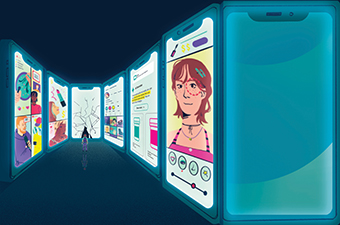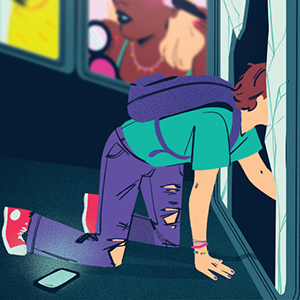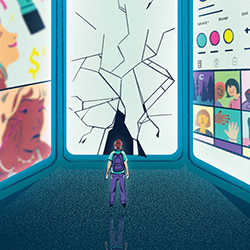
How much social media is too much for a teen? No one knows for sure, but the issue of social media addiction has many people concerned. One study, published in 2016, not only showed that 59% of parents believe their teens are addicted to their mobile devices, but 50% of teens themselves believe they are addicted. That in and of itself is alarming. However, consider that this now eight-year-old research was done prior to the widespread adoption of other more sophisticated platforms, like TikTok.
TikTok is a social media app that curates short-form videos for users and is now one of the most popular platforms used by teens 13-17 years old. It has the potential to be particularly addictive due to its computer algorithm, which allows it to analyze user behavior and curate content to match user interests—whether that’s viewing, mentioning or “liking” dance videos, study tips or acts of violence. (Plus, the opportunity to scroll never ends, so no cues exist that remind teens to stop and move on to a different activity.)
Concerns don’t just span roles and ages, nor are they confined to specific groups. At a time in history when differing beliefs are causing painful divisions within the nation, people across the political spectrum are coming together in unwavering agreement—social media is harming children and teens and something must be done. As of June, the bipartisan “Protecting Kids on Social Media” bill was pending, which would establish guidelines for social media, including banning children under age 13 from having accounts.

Carla B. Monteiro, MSW, LICSW, is manager of clinical programs at the Grayken Center for Addiction at Boston Medical Center. She also works as an emergency psychiatric clinical social worker at Boston Children’s Hospital. In these roles, she has seen the direct impact social media can have on children and teens.
“I have worked with children who are suicidal, who come to the ER as a result of something that happened on social media,” she says. “It’s important to recognize that while the trauma may be related to something like cyberbullying, it can also be caused by something more subtle, like feeling left out of a group.”
What Makes It So Appealing?
When does social media use become an addiction for a teen? Here’s a good place to begin to get a handle on what is currently considered “normal use.” According to a 2023 Gallup survey, the average teen spends 4.8 hours a day on social media. Additionally:
- 76% of teens use social media
- 92% of teens go online every day
- 24% of teens are online “almost constantly.”

There are numerous benefits to using social media, regardless of the platform a teen chooses, like staying connected with loved ones or feeling a part of their school community. Sharing creative projects like art and music can be rewarding too, and help teens build confidence and motivate them to keep practicing or creating. Social media also is a place where teens can meet and discuss ideas with new friends with shared interests. All of these interactions can increase levels of the “feel good” hormone dopamine, tying social media use to feelings of excitement and pleasure.
While these benefits ring true for people of many ages, the appeal is especially great for teens, who are still establishing their own interests, experimenting with their appearance, and shaping their own ethics and belief systems—and crave acceptance and understanding in these areas.
But even when the feedback is negative—or they’re being downright bullied—many teens feel compelled to return to the same platforms again and again. One particular area of concern is related to body shaming.
“I see many problems related to body image and eating disorders, with teens comparing themselves to unrealistic images they see on social media” says Monteiro. “But because they are in need of validation, they continue to go online.”
The Potential for Addiction May Be Worsening

Were you born before the late 1990s? Even if you weren’t, you may still recall a time when landline phones rang out regularly throughout the day. Now, imagine living in an environment where that ringing happens hundreds of times a day.
That’s the reality for many teens with social media, whose apps “ping” them and send notifications when they receive a “like” or when someone has commented on their posts. According to a recent study, it’s not atypical for teens to receive not dozens but hundreds of these alerts each day. The anticipation of receiving these notifications can be overwhelming and the urge to check them immediately can be difficult to overcome.
Who is at Greatest Risk?
Social workers are particularly skilled at recognizing warning signs when it comes to problematic use related to drugs, alcohol, gambling and other addictions. But social media has evolved so quickly, it can be difficult even for professionals to recognize signs that indicate a teen’s social media use has become an addiction. Here are some signs to look for:
- Avoiding in-person activities to spend more time online
- Getting defensive or angry if parents set limits or confront them about their use of social media
- Being continually distracted by their phones when parents spend time with them
- Buying expensive items to fit in and keep up their image on social media
- Neglecting school assignments and homework and doing poorly on exams.
Also, be aware that privately teens may be:
- Trying to hide the extent of their social media use
- Becoming upset or sad if they don’t get “enough” likes or followers
- Feeling guilty if they don’t reply to a message immediately
- Feeling upset if it takes too long for a friend to respond
- Obsessively following either people they know or influencers on social media
- Comparing their body and physical appearance to others on social media
- Becoming sleep-deprived because they use social media before bed or get up at night to use it
- Oversharing information about their personal life with people they’ve just met.
A Place to Begin

It’s no surprise to social workers that existing issues, from depression and anxiety to suicidal tendencies, can all be exacerbated by social media use. Additionally, studies suggest that teens with social media addictions are more likely to develop other addictions—especially if they are not getting the “highs” their brains crave from using social media. They may look elsewhere to create the same pleasurable sensations.
Tiyanna Washington, LCSW, is a New York City-based clinical social worker and founder of Tspeaksnyc, an agency focused on mental health and wellness programming for teen girls and women in underserved parts of the city. She frequently counsels teens on social media and screen engagement.
“I’ve found that meditation and a cognitive behavioral therapy framework has been particularly helpful,” says Washington. “It helps teens identify negative thought patterns that make them feel they have to be online or they’ll be missing out or no one will care about them.”
Washington also says asking basic questions like “What would you do if you didn’t have your phone for a day?” or challenging them to experiment with new, healthier behaviors related to social media can be surprisingly helpful.
She also recommends checking out parental control apps and chore-based apps. The first alert parents to any concerning behavior that may happen online. The other type challenges teens to complete household chores and tasks, but is presented in an engaging game-like environment, with positive mental health messages along the way.
Advising Parents: Eight Recommendations

Social workers already know that addiction treatment requires more than restricting an activity, and that underlying mental health issues must be addressed. That’s why it’s critical to advise parents that taking away social media from an addicted teen “cold turkey” will almost inevitably cause withdrawal and fail. Guide parents using the following:
- Begin with an open discussion about social media, both the positive and negatives aspects.
- Before taking more drastic measures, discuss turning off notifications. This can be a step toward healthier social media use, and teens may be more agreeable since social media isn’t being taken from them altogether.
- Remind your teen that you are there for them and always willing to listen to problems without judgment. This may make them less likely to turn to social media for answers or support.
- Remind teens that what they see on social media often isn’t realistic, especially as it relates to looks and body image. Let them know that they and all people should be valued for who they are, not how they look or act.
- Apps are available that can prevent access to social media platforms once a certain time limit is up. See if your teen is open to installing them.
- Agree on times when social media use is not allowed. For instance, restrict use during mealtimes or an hour before bedtime—and make sure everyone in the family follows these same rules.
- Agree on what should not be shared on social media. Also, remind them that what goes online could stay there forever.
- Help teens transition to less time online by planning some enjoyable in-person activities, whether it is a walk in the park, a baking session, or playing a board game together.
Maren Dale is a writer based in Washington State and has written for NASW since 2009. She has interviewed more than 500 leaders and written for more than 100 organizations in 18 states.
Resources